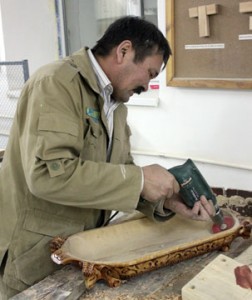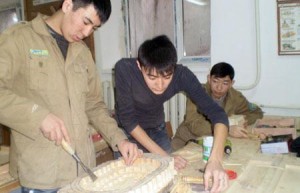 PAVLODAR – Melzhan Sydykov is a senior teacher in the department of vocational training of the Pavlodar Pedagogical Institute who says his vocation is to teach young people to make national dishes and furniture, as well as to pass Kazakh traditions, customs and way of life to his students.
PAVLODAR – Melzhan Sydykov is a senior teacher in the department of vocational training of the Pavlodar Pedagogical Institute who says his vocation is to teach young people to make national dishes and furniture, as well as to pass Kazakh traditions, customs and way of life to his students.
“We are training teachers of technology. We are actively engaged in making national utensils, dishes, furniture. Today, we understand clearly that it is necessary to revive traditions of our ancestors and it should be done from school,” he said.
In the early 2000s, his focus was on “national utensils and crockery,” and his students were required to make an asadal (national cupboard for dishes), two round tables and astabak (a big plate on which the national dish beshbarmak is served).
“I wondered, what is asadal? I heard this word for the first time in my life. I turned to books, but there was nothing about it. There was no description of the manufacturing technology for such things either. I had to ask older people for help. Thereby, I learned that the astabak, for example, has many varieties and purposes. I was very interested in it. It turned out that with this cookware [we had] imperceptibly lost our national colour and customs. And, as it turns out, dishes brought with them a certain educational culture,” he said.
Sydykov is amazed by the skills of Kazakhstan’s ancestors and their comfortable, functional household items. According to Sydykov, they were maximally adapted to the nomadic way of life.
Now, he is a skilled wood carver and makes his own original beds, dishes, boxes and other items in the national style. He gifts his best works to the regional Potanin History Museum.
Many of Sydykov’s students are talented young people who have followed in his footsteps and opened their own shops.
“I often see the works of my former students at exhibitions and I am happy for them. And also for myself. It means that I am on the right path,” Sydykov said.
